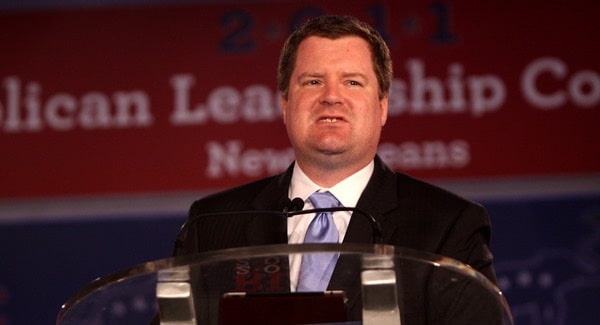
Conservative Republicans opposed to Donald Trump winning their party's nomination for president assembled in DC yesterday and called for a “unity ticket” to defeat him.
The idea put forth by conservative pundits such as Erick Erickson (above) is to wrest the nomination away from Trump at the GOP Convention in Cleveland by either putting his remaining primary challengers, Ted Cruz and John Kasich, together on one ticket, or drafting some other unknown individuals that the party could rally around.
Huddled on the second floor of the Army and Navy Club in downtown Washington D.C., the group's agenda on Thursday was twofold: first, trying to block Trump's nomination and second, if that should fail, mounting a third-party bid.
“He shouldn't be president of the United States,” said Quin Hillyer, a conservative columnist who emerged from the meeting as the new spokesman for the two dozen or so people who attended. He called the mood inside the room “resolute.”
“Not only is he not conservative,” Hillyer said, “he's also just not a good face for the country.”
Erickson, who is ill with pneumonia and participated via phone, posted a statement on his website Thursday afternoon on behalf of the group, calling itself “Conservatives Against Trump,” saying they would fight Trump to the convention — and beyond.
“We encourage all former Republican candidates not currently supporting Trump to unite against him and encourage all candidates to hold their delegates on the first ballot,” the statement said.
Hillyer added, “The consensus was that we need a unity ticket of some sort and we'll let the candidates work out who the unity ticket is.” Referring to the primary contestants left standing, Hillyer said, “Obviously, more conservatives seem to prefer Cruz to Kasich, and Cruz has more delegates right now, so if you do the math, it's probably more likely to be Cruz-Kasich.”
Kasich has said he has no interest in being anyone's VP.
The statement from the group also attempted to put a positive spin on the idea of a contested convention. “We recognize that it took Abraham Lincoln three ballots at the Republican convention in 1860 to become the party's nominee and if it is good enough for Lincoln, that process should be good enough for all the candidates without threats of riots,” their statement said.
As for the possibility of a third party bid, Hillyer said, “That would be down the line.” Yet time is quickly running out for a third party candidate to get on general election ballots.
Erickson said of his desire to ‘Stop Trump', “There's gotta be some way for the Republican Party to save itself. The final fallback option would certainly be a third-party, though the consensus was everyone would rather settle this on the convention floor.”
Politico also reached out Mark DeMoss, who was Mitt Romney's unofficial liaison to the Christian conservative community in 2012, for a comment on the anti-Trump movement. Said DeMoss, “If some of the social and religious conservatives who are working so hard to stop Trump had been less intent on trying to stop Mitt four years ago, we might be in the middle of a re-election campaign rather than this crazy primary situation.”



